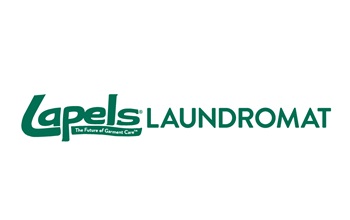🕒Estimated Reading Time: ~12 minutes
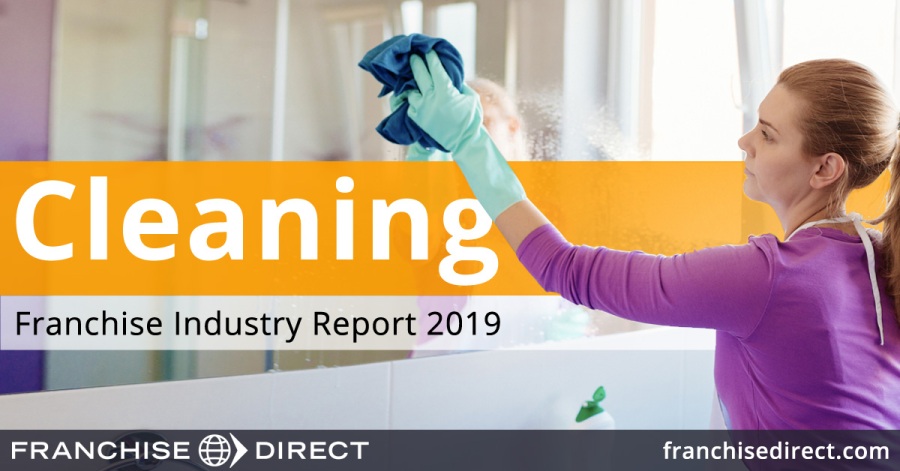
Our services are needed in every household and business across the nation. This is a recession proof business that will continue to have a positive outlook in all economical situations.
Cleaning franchises operate in the outsourced service provider area, meaning they are brought in by other companies or institutions to clean rather than those companies or institutions employing cleaning staff of their own. Leading franchises in the cleaning industry include: Anago Cleaning Solutions, Chem-Dry, Coverall, Jan-Pro, Jani-King, Maid Brigade, Office Pride Commercial Cleaning Services, PuroClean, ServiceMaster Clean, The Maids, and Vanguard Cleaning Systems.
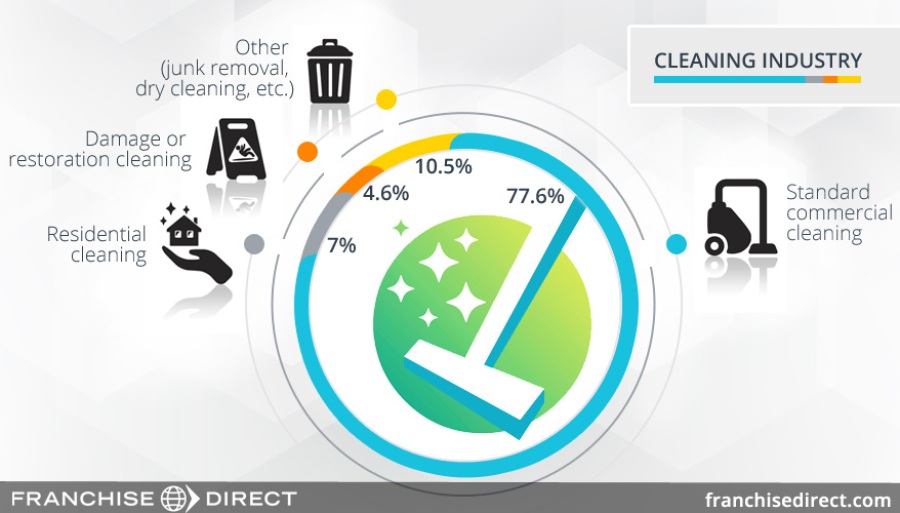
There are two main divisions of the cleaning industry: commercial cleaners (janitors and cleaners) and residential cleaners (maids and housekeepers). Commercial cleaning franchises clean places such as offices, buildings or retail stores. Residential cleaning franchises specialize in tidying things around the home such as cleaning floors, bedrooms and bathrooms.
Commercial cleaners make up the majority of people employed by the general cleaning services industry, and primarily work within the buildings and dwellings industry as well as in elementary and secondary schools. According to Statista, the revenue of janitorial services in the United States reached $61 billion U.S. dollars in 2018.
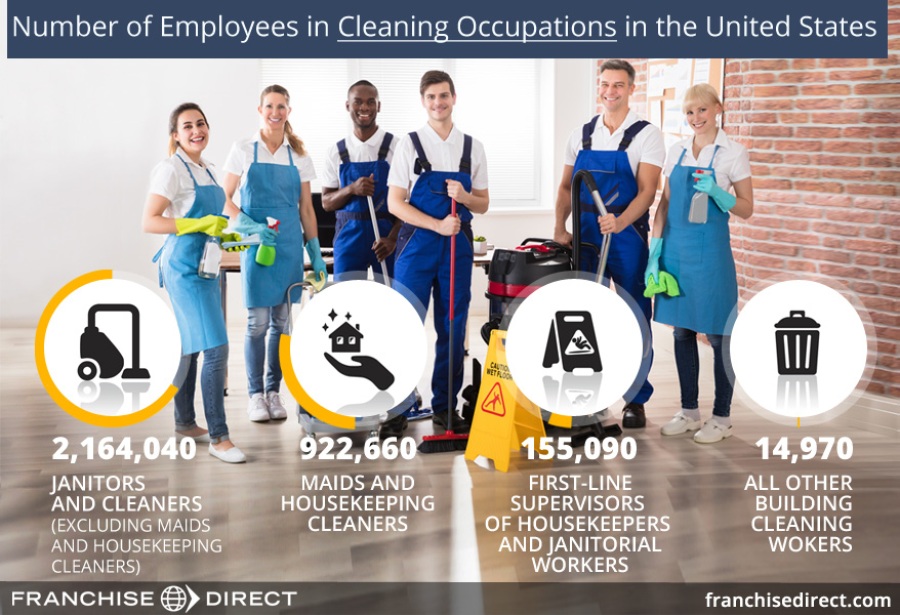
Number of Employees in Cleaning Occupations in the United States as of May 2017, by job type (Source: Statista)
Another type of cleaning franchise is restoration. These franchises focus on the recovery period after an event such as a fire, flood or other natural disaster. “The restoration cleaning industry, dissimilar from other kinds of cleaning franchises, focuses on larger issues within the house or business,” Tim Courtney, Vice President of Franchise Development at PuroClean, tells us. “Restoration cleaning refers to clean-up as a result of a natural disaster, leak from a broken pipe, fire damage, smoke damage, mold removal, and the occasional biohazard issues as well. The restoration cleaning industry is more of a specialty need-driven service that is typically driven by insurance claims.”
Restoration franchises also can provide support in dealing with the aftereffects of hoarding, as the franchise Steri-Clean is famous for. Restoration cleaning franchises can also help with decontaminating scenes involving blood and infectious diseases as well.
In addition, to the types of cleaning franchises above, there are cleaning franchises in specialty areas such as junk removal, upholstery cleaning, dry cleaning, cooking oil disposal, and more.
Cleaning Franchise Industry Growth Factors
According to market research firm IBISWorld, factors for growth in the industry include:
Those with disposable income outsourcing chores: “Wealthy consumers have the greatest propensity to hire household employees due to their higher levels of disposable income and larger estates, which require more upkeep. Therefore, increases in the number of high-earning households is positively correlated with demand for industry services. The number of households earning more than $100,000 is expected to increase marginally in 2017, however, its volatility poses a potential threat to industry operators.”
Population age increase: “The average age of the US population has been increasing, causing demand for industry services that assist the elderly in day-to-day chores to grow. Housecleaning is a common service the elderly purchase when they are no longer physically able to do it themselves. The number of adults aged 65 and older is expected to increase in 2017, representing a potential opportunity for the industry.”
Additionally, specifically for the restoration segment, growth will be focused on partnering with insurance providers. As Tim tells us, “the ultimate way [for restoration franchises] to grow is by continuing to partner with national accounts such as commercial property organizations as well as national insurance providers. We currently have the number two and three insurance providers as national accounts. Fortunately, the industry is changing in that property managers and insurance providers are looking for brands with standard operating procedures, therefore turning to larger companies like PuroClean versus your smaller private restoration company.”
Addressing Cleaning Industry Challenges with Technology
A relatively strong economy, like the one we’re enjoying now, has a bit of a downside for business owners: difficulty in finding workers. “Five years ago I might have said access to capital [was the biggest challenge to growing], but the available labor pool to build our business at every level is a pretty strong issue right now,” Steve White, president and COO of PuroClean, said in the January 2019 edition of Franchise Times.
On the quest for greater productivity and growth, cleaning franchises are looking towards technology, specifically robots, to help them maintain and improve their service efficiency. But this isn’t a robots coming to take people’s jobs situation. As a white paper from the International Federation of Robots noted: “Robots complement and augment labor. The future will be robots and humans working together. Robots substitute [labor] activities, but do not replace jobs. … Automation provides the opportunity for humans to focus on higher-skilled, higher-quality, and higher-paid tasks.”
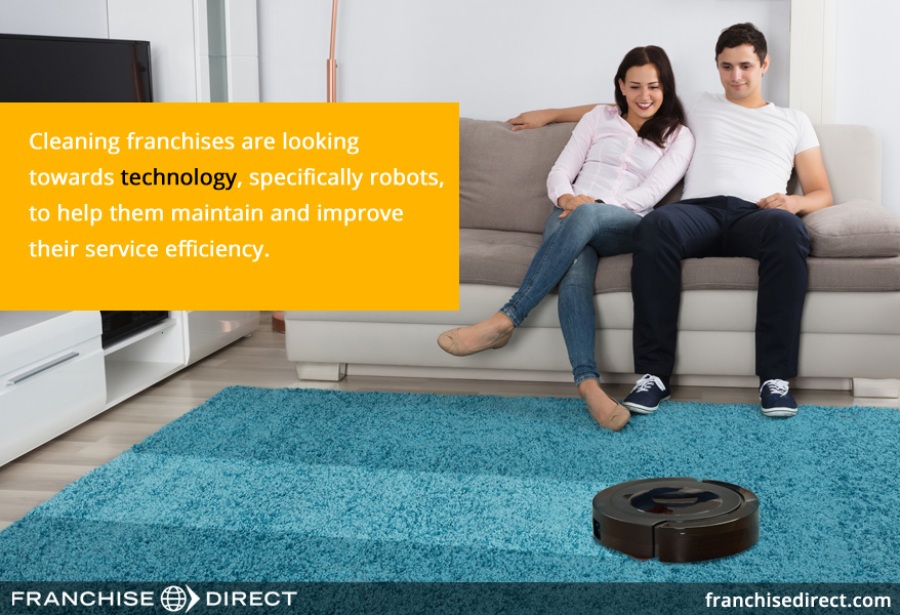
So how can human cleaners and robots work together? Here are a few ways cleaning robots are supplementing human employees via Services Magazine:
Duct cleaning: Robots can more easily access places in air ducts that would be difficult for humans to get to. Duct cleaning robots can “access the ducts from any pre-existing vents (whereas human cleaners are only able to enter the duct network from larger access points, sometimes having to cut access points in ducts if none exist). Once in the duct, the robots are remote-controlled and require a human operator. They are equipped with cameras to allow their operators to steer them.”
Floor cleaning: According to Services, up to 95% of floor cleaning cost is labor. Certain robot models already on-the-market can clean at upwards of 200,000 square feet per day. Some experts recommend having the cleaner do the tasks more effective if performed by a human, like pre-sweeping hard to reach corners, before turning the machine on. This enables the cleaner to work on other tasks while the machine does the brunt of the work.
Window cleaning: One of the more dangerous cleaning services, having robots take the risk of window cleaning is becoming more popular. In fact, the world-famous Louvre in Paris already entrusts the cleaning of its glass pyramid to a robot called robuGLASS.
Special cleaning situations: Robots are also helping where traditional cleaning methods aren’t enough, like hospital intensive care units. Robots such as the Xenex, created by researchers at the Houston Technology Center, use UV light with an energy level so high that it can disinfect rooms of infection-causing bacteria within five to 10 minutes. It’s wheeled to the rooms that need disinfecting by a housekeeper.
Evolving technology also helps cleaning franchises streamline their administrative functions. “The industry is moving more toward technology,” Anago Cleaning Systems President Adam Povlitz told us in an interview. “We have proprietary cloud based software to manage all aspects of the business, and our own proprietary Anago App for bidding and estimating, as well as customer service.” Image One Facility Solutions also developed its own proprietary technology platform so franchisees can access important information such as proposal drafts, collections, billing, franchise statements, and more in one centralized place.
Opening and Operating a Cleaning Franchise
Please note: the provisions and fees illustrated below (and in linked pages) are some of the most common and not a complete listing. Please review the Franchise Disclosure Document (FDD) of a franchise for all of the provisions and fees related to investing in that particular franchise.
What type of person is well-suited to operate cleaning franchise?
Some top characteristics franchisors are looking for in franchisees include, but are not limited to:
- Strong work ethic
- Willingness to achieve
- Someone who enjoys a challenge
- Entrepreneurial spirit
- Strong leadership abilities
- The disposition to learn and be a part of a system
“After market studies, we have concluded that business professionals are a great fit in addition to people already operating in the industry and military veterans,” according to PuroClean’s Tim Courtney. “A franchise is a systematic process, therefore, a disciplined individual who can follow an already successful process, with the passion to work hard and help people in their community.”

Making Training More Accessible
Many franchisees chose franchising because of the aspect of being in business “for yourself, but not by yourself.” A large plus for people buying a franchise is the training provided. Over the years, franchisor-led training sessions have evolved from the tried-and-true classroom sessions to also incorporating video and other digital methods like teleconferencing.
Now, podcasts are becoming part of the training mix. Office Pride Commercial Cleaning Services has begun a weekly podcast devoted to training for franchisees. Franchise President and CEO Todd Hopkins serves as the host. The podcast focuses on training topics through interviews with seasoned franchisees, business leaders, marketing experts and authors about topics that its franchisees need to know.
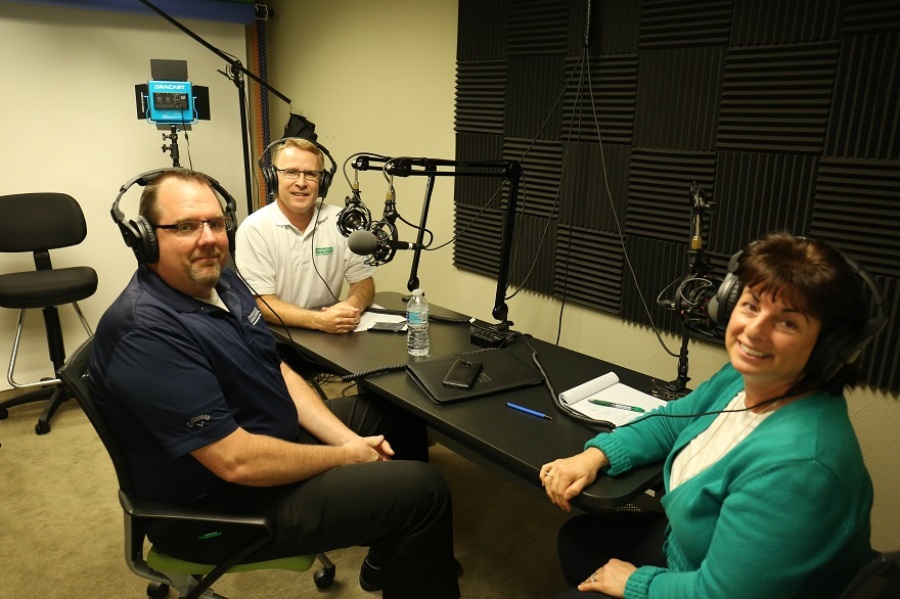
Todd Hopkins, founder and CEO of Office Pride (white shirt); Office Pride franchise owner Gregory Carr (navy shirt); Maria Haan, Office Pride Director of Operations
“Of course, we were excited about video, when that was trending, too, but podcasts are more accessible and just as effective,” Hopkins says. “We know that more people already have downloaded our podcasts than all the videos we made. Even though the podcasts are longer, they are easier to fit into your schedule. They can listen while they’re driving or even sometimes while working on routine tasks.”
The podcast also provides benefits to Hopkins as well. For him, the podcast episodes are enjoyable and help him convey knowledge from his nearly three decades of experience that may be hard to give in a traditional training format. “I really like the genuine, real conversations that we have. They are easy to listen to and offer an easy way to franchisees to learn,” he says. “Of course, we can always put together training in a classroom format, but it’s not any more effective, and it’s certainly not as accessible. Plus, when we get into conversations, it draws things out of my head from 27 years of experience that I may forget to include in a workshop.”
The podcasts are decided on by franchisees’ feedback, and cover everything from hiring to billing to customer service. “We started with a series on hiring and keeping good quality workers,” says Hopkins. “Our theme for 2019 is to ‘Achieve Customer Amazement,’ so we are doing a series on that. Recently, we aired a podcast on the importance of answering the phones instead of letting them to go to voicemail.”
For more on the franchise, please visit our Office Pride Commercial Cleaning Services profile.
Handling the Administrative Work
Below you’ll see that the initial investment range for cleaning franchises in general tend to be lower than for other franchise industries (the initial investment for a single unit franchise typically falls in the $100,000 to $300,000 range). The difference can be attributed to many cleaning franchises not requiring dedicated office space, or the ability to run the franchise from home.
But since these franchises are often run out of a home office or on-the-go, they require special attention to how cleaning franchisees handle their administrative work. Here are some
tips from Cleaning Business Today for “prioritizing when you work from home.”
- Break down annual goals by quarter and remind yourself of them often
- Make a to-do list each day
- Focus on the business essentials for a couple hours every day
- Review your “big picture” once a week
- Work on something “fun” regularly
- Give yourself permission to “be distracted sometimes”
- Hire a virtual assistant to help with some tasks, if necessary
Initial Investment
The opening costs for a cleaning franchisee can depend on many factors, including but not limited to: the business system and execution requirements, the size of the territory the franchisee desires, and more.
Franchisors offer estimates in their franchise disclosure document (FDD) based upon their experience establishing, and in some cases operating, units. However, prospective franchisees should keep in mind these estimates are just that—an estimate. Prospective franchisees should review the figures presented with a business advisor, taking into consideration their unique circumstances, before making the decision to enter into a franchise agreement.
Ongoing Fees
Throughout the length of the agreement there are costs for being a part of the franchisor’s business system.
These costs include items such as royalty fees, charges for technical support, and continued marketing costs. The most common is the royalty fee. Royalty fees are assessed for the continued use of the franchisor’s trademarks and patented processes, along with certain types of operational support.
In addition to regularly assessed fees, other fees are charged on an “as needed” basis such as audit fees, or costs for additional, non-mandatory, training. Prior to investing, prospective franchisees should do their research and carefully review a franchisor’s FDD for more detailed information on all systems, procedures and costs.
For more information on a number of franchises currently seeking franchisees, please see our cleaning franchise industry profiles.
Hottest Cleaning Franchises

Kwik Dry Carpet & Air Duct Cleaning
Provide carpet cleaning, upholstery, air duct cleaning, tile & grout cleaning, disinfecting services & more with our total cleaning multi-revenue business!
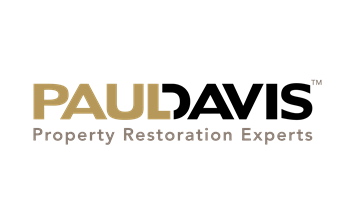
Paul Davis Restoration
Join North America’s #1 leading insurance restoration network. Year-round demand in a booming industry!















